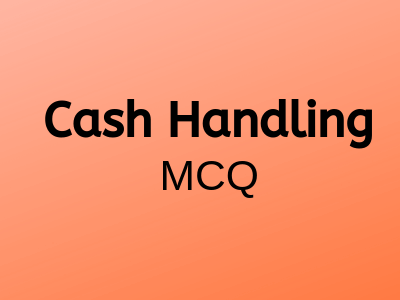1. What is a slide?
A. When you change teller drawers
B. When you switch numbers (56/65)
C. When you add or leave off zeros (correct answer)
ANS:- C
2. You should always verify money received from: (Choose all that apply)
A. Another teller (correct answer)
B. The vault (correct answer)
C. Customers (correct answer)
D. Night drop (correct answer)
E. All of the Above
ANS:- E
3. Some of the features on a bill include: watermarks, micro-printing, security threads and color shifting ink.
A. True (correct answer)
B. False
ANS:- A
4. When is money considered mutilated? (Choose all that apply)
A. Badly Soiled (correct answer)
B. Corner is missing
C. Badly Torn (correct answer)
D. Badly Worn (correct answer)
ANS:- A,C,D
5. Accuracy is more important than speed.
A. True (correct answer)
B. False
ANS:- A
6. The goals of con artists are to: (Choose all that apply)
A. Distract your attention (correct answer)
B. Get you to make an exception (correct answer)
C. Lower security awareness (correct answer)
D. Skip a necessary procedure (correct answer)
E. All of the above
ANS:- E
7. When do you sell mutilated money and to whom?
A. Once a month or as requested, to a designated teller (correct answer)
B. Once a month to your manager
C. Once a year to designated teller
ANS:- A
8. What is the most common reason tellers are out of balance?
A. The job is too hard
B. Computer failure
C. Customers do not complete their forms correctly
D. Lack of concentration (correct answer)
ANS:- D
9. What should you do when you buy money from the vault or another teller?
A. Place all straps in top drawer
B. Verifythe funds immediately and then re-strap the money and initial the strap. (correct answer)
C. Place your initials on the existing strap
D. Only verify the 20’s, 50’s and 100’s
ANS:- B
10. What is a transposition?
A. When you switch numbers (56/65) (correct answer)
B. When you add or leave off zeros
C. When you change teller drawers
ANS:- A
CASH HANDLING Objective Questions Pdf Free Download ::
11. What steps must be taken before paying out cash? (Choose all that apply)
A. Stay within your limits (correct answer)
B. Count the cash 2-3 times (correct answer)
C. Clear your teller counter (correct answer)
D. Check customer’s identification (correct answer)
E. All of the above
ANS:- E
12. How much cash should be in the bank when you take over a shift?
A. Cash = $300, Petty Cash Receipts & Cash Paid out Receipts can vary
B. Cash, Petty Cash and Cash Paid Out Recipts can all very – The balance will depend on the shift.
C. If petty cash receipts are less than $50, then Cash will be at $300
D. Cash + Petty Cash Receipts + Cash Paid Out Receipts = $300 (correct answer)
ANS:- D
13. What special measures must be taken for cash-paying guests at check-in?
A. If the guest would like to purchase pay-per-view movies, or make long distance phone calls, collect a $25 deposit.
B. Turn off pay-per-view movies and long distance if they do not want to post a deposit.
C. Copy a current picture ID and staple it to the registration card.
D. Post the cash to their folio (billing screen) immediately.
E. All of the above (correct answer)
ANS:- E
14. You are personally responsible for your $300 cash drawer and all cash received on your shift. This means that missing cash may be deducted from your wages.
A. True (correct answer)
B. False
ANS:- A
15. What is the Best Practice for preparing a Cash Drawer for the next shift?
A. Take out the amount you collected and leave the rest.
B. Count out $300 in smaller bills and coins, to leave the next shift many options for making change. Have the next shift count , and agree to the drawer balance before you leave the area. (correct answer)
C. Leave as few bills in the drawer as possible.
D. Let the next shift count the drawer .
ANS:- B
16. The Best Practice(s) for preparing a Cash Drop are…
A. Record your name and date on the cash drop envelope
B. Record a detailed accounting for each bill denomination and coin denomination.
C. Count twice to ensure accuracy
D. Complete all fields on the Front Desk Cash Drop Sheet and have another Team Member witness your drop.
E. Report missing cash, or extra cash, directly to your supervisor
F. All of the above. (correct answer)
ANS:- F

